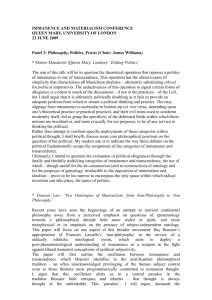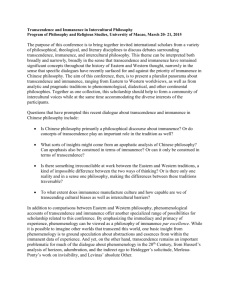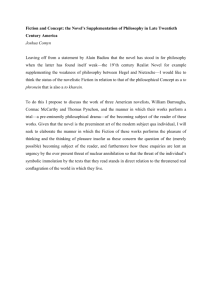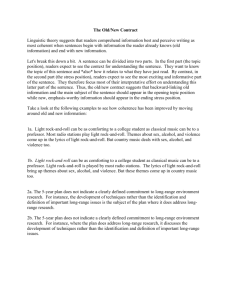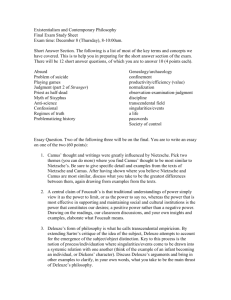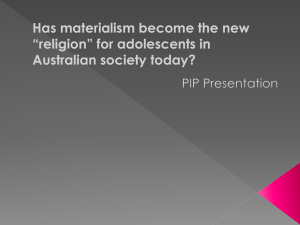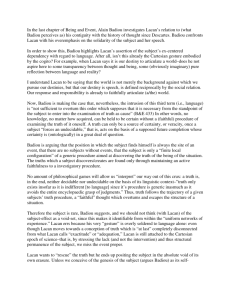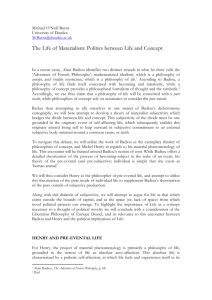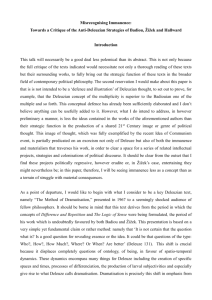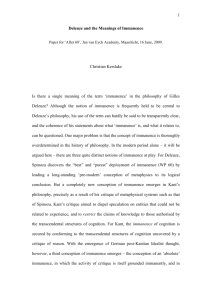Panel 1 - Queen Mary University of London
advertisement
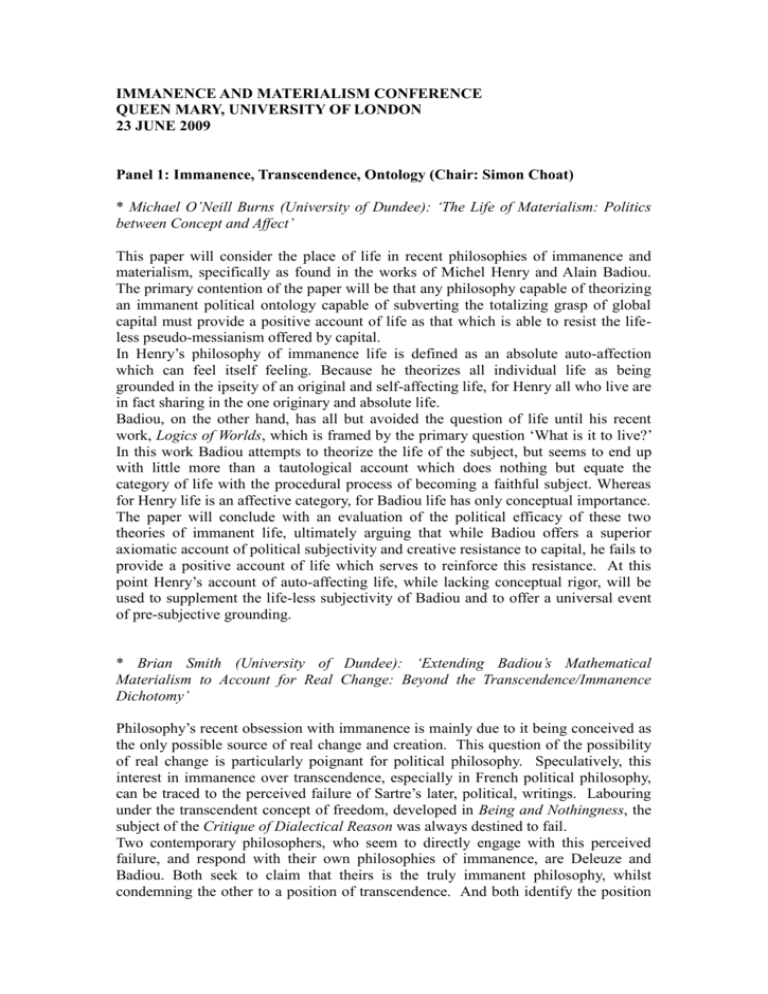
IMMANENCE AND MATERIALISM CONFERENCE QUEEN MARY, UNIVERSITY OF LONDON 23 JUNE 2009 Panel 1: Immanence, Transcendence, Ontology (Chair: Simon Choat) * Michael O’Neill Burns (University of Dundee): ‘The Life of Materialism: Politics between Concept and Affect’ This paper will consider the place of life in recent philosophies of immanence and materialism, specifically as found in the works of Michel Henry and Alain Badiou. The primary contention of the paper will be that any philosophy capable of theorizing an immanent political ontology capable of subverting the totalizing grasp of global capital must provide a positive account of life as that which is able to resist the lifeless pseudo-messianism offered by capital. In Henry’s philosophy of immanence life is defined as an absolute auto-affection which can feel itself feeling. Because he theorizes all individual life as being grounded in the ipseity of an original and self-affecting life, for Henry all who live are in fact sharing in the one originary and absolute life. Badiou, on the other hand, has all but avoided the question of life until his recent work, Logics of Worlds, which is framed by the primary question ‘What is it to live?’ In this work Badiou attempts to theorize the life of the subject, but seems to end up with little more than a tautological account which does nothing but equate the category of life with the procedural process of becoming a faithful subject. Whereas for Henry life is an affective category, for Badiou life has only conceptual importance. The paper will conclude with an evaluation of the political efficacy of these two theories of immanent life, ultimately arguing that while Badiou offers a superior axiomatic account of political subjectivity and creative resistance to capital, he fails to provide a positive account of life which serves to reinforce this resistance. At this point Henry’s account of auto-affecting life, while lacking conceptual rigor, will be used to supplement the life-less subjectivity of Badiou and to offer a universal event of pre-subjective grounding. * Brian Smith (University of Dundee): ‘Extending Badiou’s Mathematical Materialism to Account for Real Change: Beyond the Transcendence/Immanence Dichotomy’ Philosophy’s recent obsession with immanence is mainly due to it being conceived as the only possible source of real change and creation. This question of the possibility of real change is particularly poignant for political philosophy. Speculatively, this interest in immanence over transcendence, especially in French political philosophy, can be traced to the perceived failure of Sartre’s later, political, writings. Labouring under the transcendent concept of freedom, developed in Being and Nothingness, the subject of the Critique of Dialectical Reason was always destined to fail. Two contemporary philosophers, who seem to directly engage with this perceived failure, and respond with their own philosophies of immanence, are Deleuze and Badiou. Both seek to claim that theirs is the truly immanent philosophy, whilst condemning the other to a position of transcendence. And both identify the position of immanence as the only one capable of accounting for real change and novelty. For the sake of argument, I will side with Deleuze, and claim that Badiou’s philosophy is still essentially transcendent. The central position of the subject in his work, and the focus on freedom, embodied in his mathematical materialism by the Axiom of Choice, shows a conceptual fidelity to Sartre’s notion of freedom. In this paper I will show how, by examining the method of set theoretical forcing associated with the independence of the Axiom of Choice, as opposed to the standard method employed in Being and Event, we can expand the mathematical materialism of Badiou to encompass Deleuze’s position. The purpose of this will be to demonstrate that by adopting an adequate formal materialism we can account for real change in both a non-subjective immanent sense and in a subjective transcendent sense. We move beyond the transcendent/immanent dichotomy to engage directly with the question of change and creation. * Paul Rekret Transcendence’ (Queen Mary, London): ‘Derrida, Foucault, Immanence, While in 'Absolute Immanence' Giorgio Agamben famously draws a distinction between on the one hand, Deleuze and Foucault and Derrida and Levinas on the other, as two distinct Heideggerian trajectories of immanence and transcendence in late 20th century philosophy, nothing is said by Agamben of the meaning and implications of conceiving such a division. This paper will engage Agamben's schema by constructing a dialogue between Derrida and Foucault. While Derrida's notion of the 'double-bind' maintains the necessity of working through transcendental ideas as regulative for thought, Foucault attempts to displace the transcendental altogether. Thus, if what unites both thinkers is their desire to no longer submit and govern thought by transcendental grounds, it is in the way Derrida and Foucault attempt to displace the necessity of grounds or foundations which their differences appear. How are we to conceive the relation between these two strategies? What kind of politics do they produce? What do their differences tell us about the status of 'post-essentialist' political thought? It is to these questions which this paper will seek to respond.
